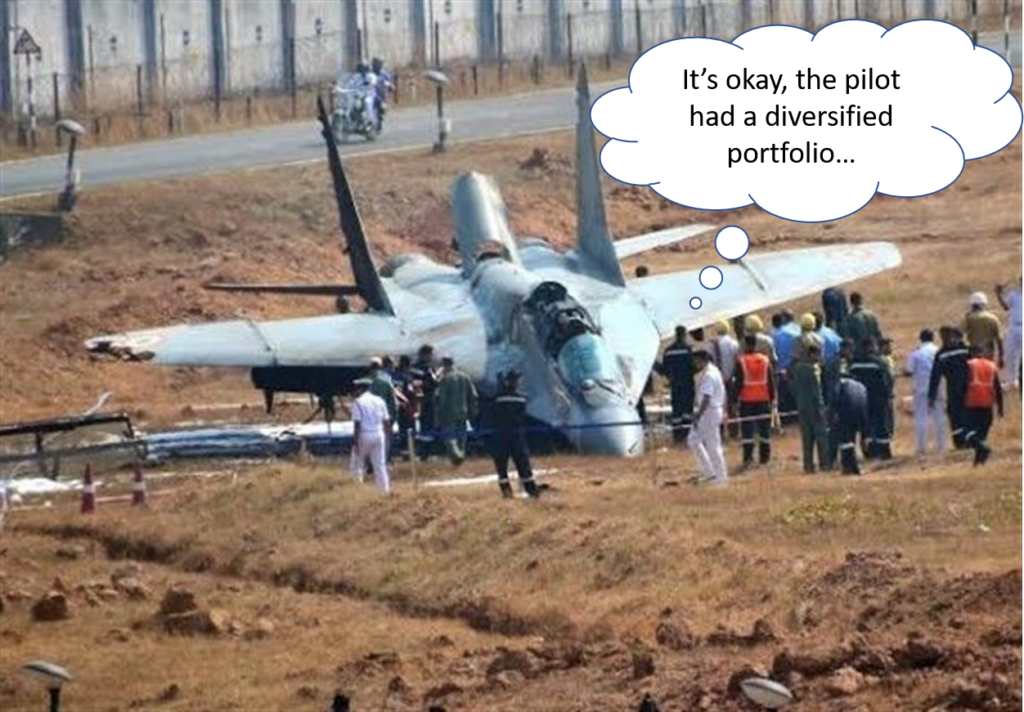How Fighter Pilots Prepare for a Crash
We generally hope that our takeoffs and landings are equal. When it comes to stock market trajectory, the long-term trajectory has been positive (nearly 10% since the Great Depression), but the market does crash and we all need to be prepared for the next one. (In case it’s not clear, we’re going to be talking about stock market declines, not uncontrolled impacts with other objects like planets and boats, etc.)
Keep Calm and Know Boring Things
Given the hype from the outrage-industrial complex on TV and the web, it might be helpful to review some vocab that frames the market crash discussion:
- Bear Market – A decline of 20% from recent highs
- Market Correction – A decline of 10% from recent highs
- Recession – Formerly, this had a clean definition of 2+ quarters of declining GDP (gross domestic product). Now it is a squishier decline in economic activity lasting more than a few months and visible in several economic indicators like unemployment, GDP, etc.
- Depression – Similar to a recession, you’ll find lots of definitions, but a useful one is: a lengthy and severe downturn in economic activity, lasting years with annual declines in GDP of 10% or more.
In modern times, which I’ll define as the 20th Century to the present, there have been nine bear markets (specifically from the Great Depression to the COVID decline). They lasted between (less than) six months and just under three years—meaning the market always recovered and kept climbing despite the damage done to individuals and businesses. That math says to expect a bear market about once every 7-10 years.
Corrections are much more frequent, occurring as often as every two years, and generally recovering faster than bear markets.
Not every bear market or correction causes a recession or depression. Volatility is part of the stock market, so we need to expect it and plan to use it to our advantage, or at least put those nerves of steel we use in the cockpit to use on the ground.
Fighter Pilots have 20/20 Vision
We’re (probably?) past the worst economic effects of COVID, at least as professional aviators. We’re definitely way past the Great Recession and the Dot Com recession. So, while we’re known for our keen vision, it’s important to use that 20/20 hindsight and pull some DFPs out of those experiences. Put another way, if you knew a bear market and possible recession were coming, what reasonable actions might you have taken?
I’ll skip the time-travel-movie effects of actions like shorting specific stocks and sectors and suggest more durable ideas:
- Dry Powder. A cash emergency fund is handy pretty much always. It helps us sleep at night in the good times and bad. If you happen to have more cash than you reasonably need during a correction/bear/recession, you’ll be able to buy assets at fire-sale prices.
- Cash causes drag on an overall investment portfolio, but missiles cause drag on wings. We carry a few of those despite the drag, and the tradeoff is generally worth it for the options they bring.
- Diversification. If all of your assets are in cryptocurrency, real estate, oil stocks, etc., and that happens to be the market segment that gets speed-bagged in the next pullback… well, as Uncle Warren says, “When the tide goes out, you can tell who’s been skinny dipping.” We diversify our portfolios not to avoid all losses during market declines, but to lessen the blow.
- A diversified portfolio likely creates the opportunity to sell some assets that have over-performed in order to buy assets that are currently underperforming during a decline. Sell high, buy low often works best when the market is in retreat. Again, quoting from the book of Buffet, “Be fearful when others are greedy, and greedy when others are fearful.”
- Leverage. Many of us are risk-takers as evidenced by the propensity to strap a marginally-controlled explosion to our backsides and use it to tempt fate while delivering death and destruction on demand and whatnot… Debt doesn’t feel so risky in the good times, but it’s fairly problematic when markets head south.
- Lenders may be able to call a loan and foreclose if you can’t pay the balance immediately. Did you read all of the fine print?
- Lenders issue less credit in bad times. Banks cancelled credit cards and reduced limits during the Great Recession right when many families thought credit cards could double as an emergency fund.
- Home equity evaporates too. Not only can lenders stop issuing home equity loans, the equity itself can vanish making a sale more costly.
- Even if you’re solvent and have a good job, you might not find a loan or good terms to buy assets with during an extended recession.
- Job Security. We generally view military service as stable in the 11F/12F world. But even if a RIF isn’t likely, we can still get medically separated or retired in a heartbeat. If that happens when employers are culling the herd, your problems may compound a bit.
- This ties into the need for a cash emergency fund, but if you’re planning to retire or separate, what is your plan B if the airlines hit the panic button right before you start training?
- When transitioning between jobs, storing up cash and potentially seeking multiple streams of income, at least temporarily, can help cushion the blow of market turbulence and a potential recession.
- A Plan. We all know we’re supposed to have a written plan that describes our investment goals, strategy and tactics. Few of us actually have written that plan. A written investment policy statement (IPS), authored at 1G and 0kts, helps us write the “hatched pages” of our checklist so that we known what to do when the investment world seems like all out of thrust. If you plan your criteria for rebalancing and tax-loss harvesting, chances are, that periods of severe market volatility would be a callout in your IPS for those very activities. You might also use your IPS to identify how to handle appreciated shares of stocks, mutual funds, or ETFs in a taxable account. Your IPS could even identify market downturns as an ideal time to do Roth conversions since the value of your pre-tax holdings might be depressed—potentially while your tax bracket is too!
Las Vegas Odds
I was stationed at Nellis from 2006-2009 during the start of the Great Recession. I had just come from Eglin where I sold a home in 2006 for twice what I paid in 2003. I dumped most of the proceeds from that sale into a new build in North Las Vegas (far enough from the FEBA), thinking like most everyone else, “Of course the market will keep climbing…”
I sold that home in 2010, thanks to the HAP program, for just over a third of what I paid for it. Eleven years later, that home still hasn’t reached the price I paid for it. If I had kept it, I’d likely have lost $12K per year in negative cash flow from rent alone, which is still less than the amount I lost at closing (thankfully only on paper).
We were very fortunate during that recession. We had job security, an emergency fund, debt only on our home, and a diversified portfolio (we did not have a written plan…). Clearly the debt out the house was a nuclear-powered albatross on our backs, and our diversified portfolio got obliterated with the rest of the stock market too.
Job security and some cash to manage the unforeseen helped us weather that storm. So, while I recommend all five tools above—cash, diversification, job security, minimal leverage, and a written plan, there are no silver bullets.
Lessons Learned or Lessons Observed?
One of the reasons stock market declines auto-accelerate is the rapid spread of panic. Even experienced investors can succumb to the four most dangerous words in investing—“This time it’s different.”
William Bernstein speaks of the four truly catastrophic effects on wealth: inflation, deflation, confiscation, and devastation.
- Inflation—Specifically hyper-inflation makes money nearly worthless. Some inflation is generally viewed as good for an economy. Finding the sweet spot in between is difficult.
- Deflation—One way to deal with the current spike in home prices would be for everyone to forgo their purchase until prices decline. Once prices begin to decline, some will keep waiting for them to decline more. The downward spiral can be hard to stop. (Since people need a place to live, this isn’t the most likely case for housing just yet…)
- Confiscation—When a government takes over industries and assets, personal wealth disappears.
- Devastation—Natural and man-made disasters can obliterate wealth too. Have you checked your HO-3 homeowner’s policy recently? There are a few things it doesn’t cover…
So, if one of the “4 Horsemen” isn’t the reason for a market decline, then it’s likely in any given decline that the normal, but unpredictable business cycle and market forces are at work. Since history shows that the market recovers, should we have faith?
If there are 4 Horsemen of the financial apocalypse, there are also another 4 Horseman holding the apocalypse at bay:
- Property Rights—Our laws give excellent protection to personal and business property, including intellectual property. Except by criminal theft, you stand little chance of losing your possessions. Even in cases of theft, we have commercial and government insurance backing many of our asset rights.
- Rule of Law—Our country isn’t perfect, but rule of law still generally prevails. One relevant example is the regulation and enforcement around securities. While you can take risk and invest in private equity with little transparency, when you buy a share of a mutual fund from a brokerage firm, your investment shouldn’t contain any unknowable risks. Rule of law underpins a safe and reasonably transparent marketplace.
- Ingenuity—Humans invented wedges, levers, pulleys, iPhones and rocket ships that land on boats. The drive to invent newer and better technologies is innate enough that you can count on it staying around to make your life better too.
- Greed—While generally not our most flattering human trait, humans tend to want bigger, better, faster, and more… of pretty much everything. This creates a marketplace which flourishes if property rights, rule of law, and ingenuity are still solidly functioning.
So yes, market catastrophes can and do happen on Earth and there is a nonzero chance that one or more of the 4 Horseman could hit our markets in the United States. But there are truly resilient pillars holding them back. Faith in property rights, rule of law, ingenuity, and greed generally propels our markets upward despite period pullbacks.
Cleared to Rejoin
There’s a lot of hype about inflation and over-heated markets right now. But there’s always a lot of hype about something if you listen to all of the chicken littles out there. Yes, several bear markets are in our future over the decades, but continual growth over time probably is too. Since we know several market crashes are in our future, there’s no time like the present to make sure we have an emergency fund, proper diversification, minimal debt, a clear-eyed view of our job security, and a written plan. While these aren’t the only tools to help you in the next market crash, they should form the foundation of your planning. When you have them in place, you’ll likely be able to capitalize on opportunities to buy low rather than having to sell low during the next crash. Even if you just ride the market roller coaster out (my preferred technique), you can do so calmly knowing… this time, it probably isn’t different.
Fight’s on!
Winged Wealth Management and Financial Planning LLC (WWMFP) is a registered investment advisor offering advisory services in the State of Florida and in other jurisdictions where exempted. Registration does not imply a certain level of skill or training.
This communication is for informational purposes only and is not intended as tax, accounting or legal advice, as an offer or solicitation of an offer to buy or sell, or as an endorsement of any company, security, fund, or other securities or non-securities offering. This communication should not be relied upon as the sole factor in an investment making decision.
Past performance is no indication of future results. Investment in securities involves significant risk and has the potential for partial or complete loss of funds invested. It should not be assumed that any recommendations made will be profitable or equal the performance noted in this publication.
The information herein is provided “AS IS” and without warranties of any kind either express or implied. To the fullest extent permissible pursuant to applicable laws, Winged Wealth Management and Financial Planning (referred to as “WWMFP”) disclaims all warranties, express or implied, including, but not limited to, implied warranties of merchantability, non-infringement, and suitability for a particular purpose.
All opinions and estimates constitute WWMFP’s judgement as of the date of this communication and are subject to change without notice. WWMFP does not warrant that the information will be free from error. The information should not be relied upon for purposes of transacting securities or other investments. Your use of the information is at your sole risk. Under no circumstances shall WWMFP be liable for any direct, indirect, special or consequential damages that result from the use of, or the inability to use, the information provided herein, even if WWMFP or a WWMFP authorized representative has been advised of the possibility of such damages. Information contained herein should not be considered a solicitation to buy, an offer to sell, or a recommendation of any security in any jurisdiction where such offer, solicitation, or recommendation would be unlawful or unauthorized.






